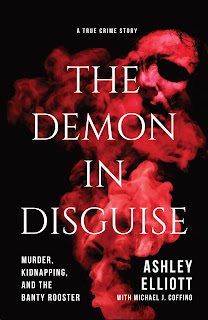Ashley Elliott is the author, with Michael J. Coffino, of the new true crime book The Demon in Disguise: Murder, Kidnapping, and the Banty Rooster. It focuses on the murder of her father in 2002. She lives in Utah.
Q: You've said, "I believe writing this book has been the greatest thing I could have ever done for myself." Can you say more about that?
A: Writing became a powerful vehicle that freed me to take a deep dive into troubling parts of my past.
With the distance of time, it provided insights, uncovered new and enlightening information regarding what happened to my father and mother, and enabled me to better come to terms with the emotional trauma that had haunted me. Still, it wasn’t an easy process.
I hired a co-author, Michael J. Coffino, who in addition to being a full-time author, ghostwriter, editor, and writing coach, was a trial attorney. After almost 20 years of suffering the criminal justice system, I knew this much if I were to write a book: I needed both an attorney and a professional writer.
We had weekly interviews, what were for me a series of therapeutic conversations, and for him a treasure trove of critical information. We explored my feelings in-depth.
It was both refreshing and draining to have an experienced questioner probe deeply, not to trick me, but to honestly help me see into and past my pain and see from a safe place the role the criminal justice system played in the ugliest parts of my life.
The process was at once exhilarating, exhausting, and upsetting. Based on voluminous investigative files we obtained and various third-party interviews, I learned in surprising detail what the criminal justice system turned up over 10 years.
Michael made no attempt to spare me from my own emotions or hide the truth, other than his heartfelt recommendation that I not look at certain crime scene photos.
For the first time I felt safe to cry, scream, yell, and act out like I wanted in the comfort of my own home, free from the judgment of others. It was a beautifully cathartic experience.
Q: How would you describe your relationship with your father?
A: Relationship-wise, my dad and I were a perpetual work in progress.
During my early years, high school and thereabouts, our relationship was part tumultuous, part cane sugar. We operated in extremes.
We could go six months without speaking, quickly and happily forgive each other for whatever it was that brought chilly silence, and move on as if nothing untoward had happened. That became our dysfunction normal, for a time. Living in an emotional survival mode with him sometimes exhausted me.
As time advanced, however, and we both matured some, we began to find our way back to each other.
For my part, I began to realize and cherish how much I could count on him, that despite the intermittent theatrics of our father-daughter back and forth, he was dedicated to me, my perpetual cheerleader and champion.
If I needed him, I had only to reach out and he’d show up unconditionally and enthusiastically. Knowing that comforted me, and it became the touchstone of our evolving relationship in the period leading up to his passing. It is that memory that burns brightest in my heart and why I love him dearly.
Q: How was the book's title chosen, and what does it signify for you?
A: My brilliant co-author came up with the title for the book while studying the investigative files.
Once we had The Demon In Disguise, the other titles we had assembled quickly lost their luster. The new title seemed so apt. The combination of my Christian upbringing and knowledge of the Bible and the circumstances of the crimes made me see Dick Conte, the murderer and kidnapper, as a demonic being in costume.
Dick Conte entered our lives as my uncle’s best friend. The advance billing was that he was a wealthy ER doctor and respected military man, doing mercenary work for the U.S. government abroad.
He also professed his undying love for my mother, promising to take care of her and my brother and me for the rest of his life. Skeptical as I was of his genuineness, I allowed him to slither his way into my life.
In the end, however, the homicidal Conte was a total pretender. He didn’t have a military background—it was all lies—and he didn’t love my mother—he clung to her as a symbol of social acceptance and personal legitimacy. He was faux to the core, the quintessential demon in disguise.
Q: What do you hope readers take away from your story?
A: Even though I wrote this book for myself, I pray that readers who have had similar traumatic experiences or are close to people who have, will find encouragement and hope in my story.
I pray they will see that while the path is littered with pain, we each have reservoirs of courage that will help us arrive at softer, kinder places in our hearts and souls.
Many have suffered similar grief, loss, depression, loneliness, guilt, and shame. It is my hope that the book will resonate with readers so they know they are not alone, that self-advocacy is a choice we make, and that it is a rewarding choice, and that healing is within each of our grasps.
Q: What are you working on now?
A: For now, I am focusing on promoting the book. I have, however, another book idea and look forward to tackling that project when time permits.
Q: Anything else we should know?
A: I am grateful for this opportunity to share my thoughts and feelings. I urge others who have had similar experiences to reach out directly. We are in this together.
--Interview with Deborah Kalb


No comments:
Post a Comment